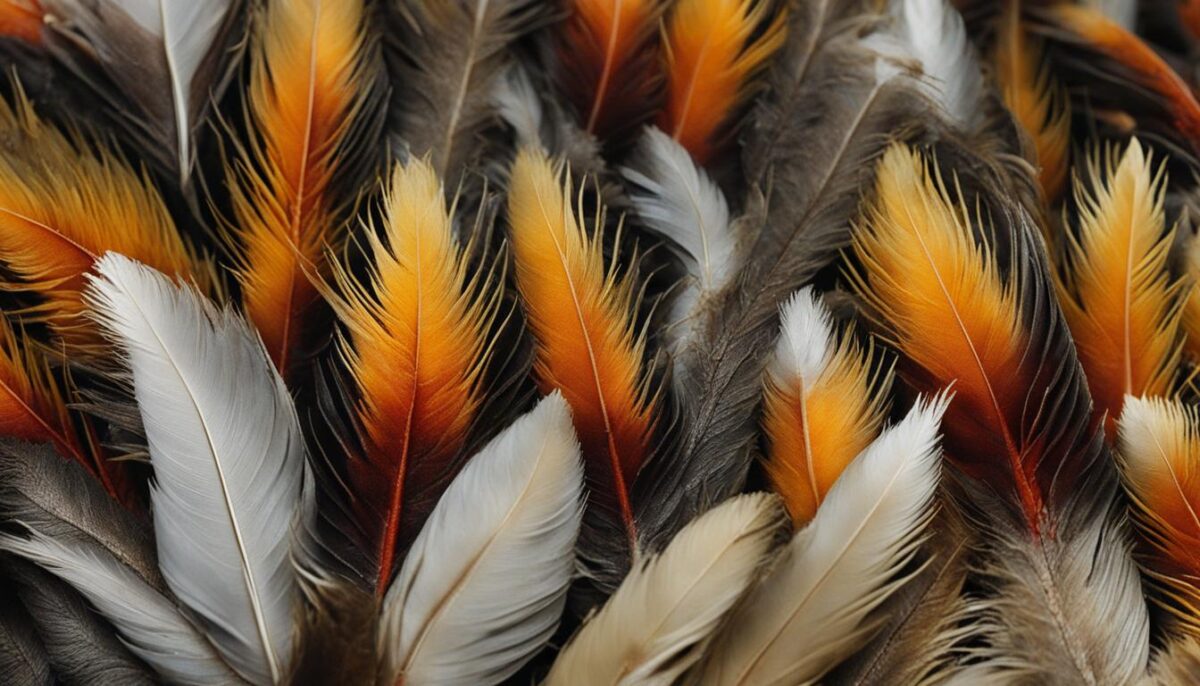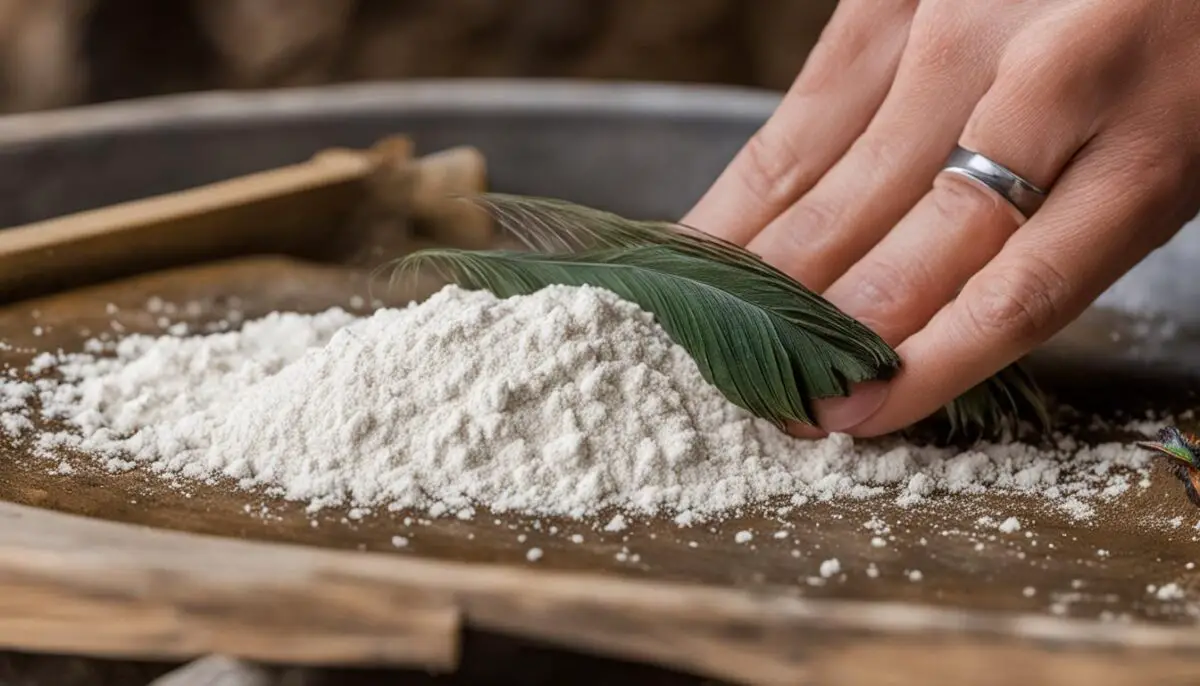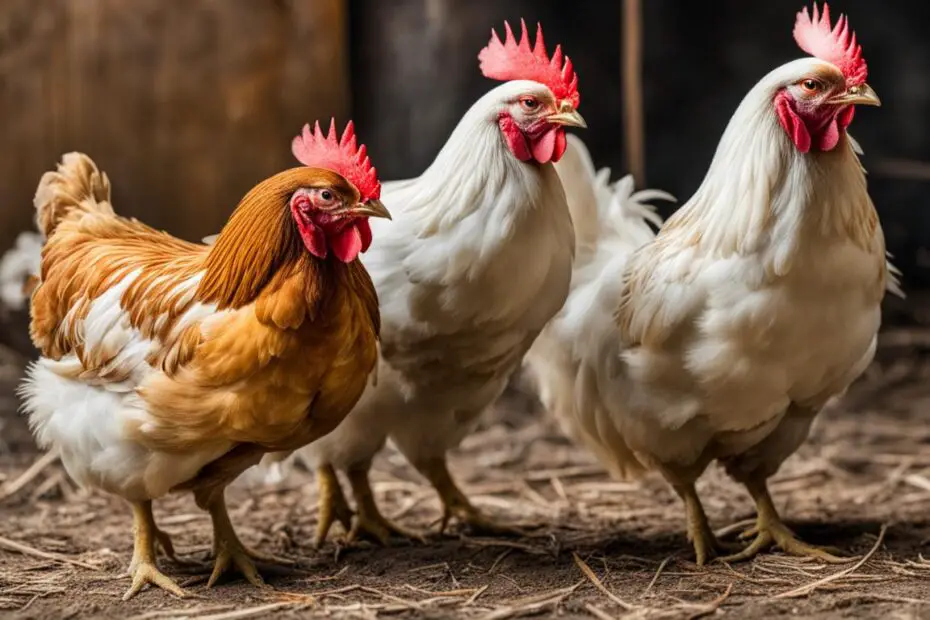Chickens are fascinating creatures that require proper care and attention to thrive. However, feather loss can be a common concern for chicken owners, and it can be challenging to determine the underlying cause. Is it molting, a natural process where chickens shed old feathers and grow new ones, or is it a mite infestation? Understanding the difference is crucial for effective treatment and maintaining the health of your flock.
Key Takeaways:
- Molting is a natural process where chickens shed old feathers and grow new ones.
- Chicken mites are pesky parasites that can infest chickens and cause feather loss.
- Identifying the signs and symptoms of molting and mite infestations is essential for proper treatment.
- Providing proper care, nutrition, and cleanliness can minimize the impact of molting and prevent mite infestations.
- Consult a veterinarian for effective chicken molt treatments and mite control.
What is Molting and Why Do Chickens Molt?
Molting is a natural process in chickens where they shed old feathers and grow new ones. It is a vital part of their life cycle and serves several important purposes. Understanding the signs of molting and how to prevent excessive molt is essential for the well-being of your flock.
During molting, chickens go through a phase of feather loss as old feathers are shed and replaced with new ones. This process allows them to renew their plumage, ensuring that their feathers remain in optimal condition. It also serves as a means of insulation against the cold weather, protecting them from the elements.
In addition to feather renewal, molting plays a crucial role in attracting mates. The growth of new feathers during the molt results in vibrant and attractive plumage, making chickens more desirable to potential mates. So, while molting may cause some temporary inconveniences, it is a natural and necessary process for your chickens.
Signs of Molting in Chickens:
- Feather loss
- Decreased egg production
- Changes in appetite
Preventing excessive molting can be achieved through proper care and nutrition. Providing a well-balanced diet that is rich in protein and essential nutrients can support healthy feather regrowth and minimize the impact of molting. Minimizing stress factors such as overcrowding, sudden environmental changes, and predator threats can also help prevent excessive molt in chickens.
Now that you understand what molting is and why chickens molt, let’s delve deeper into understanding chicken mites and their effects in the next section.
Understanding Chicken Mites and Their Effects
Chicken mites are tiny ectoparasites that can have detrimental effects on your flock. These pesky creatures live on chickens and feed on their blood, causing a range of problems including feather loss, irritation, anemia, and decreased egg production. It’s important to be able to identify a mite infestation early on so that you can take the necessary steps to control and prevent it.
There are several signs that indicate a chicken mite infestation. One common symptom is dirty vent feathers, as mites tend to gather in this area. You may also notice pale combs, as mites cause anemia in chickens. If you observe your chickens excessively scratching or pecking at their feathers, it could be a sign of mite irritation. Additionally, a decline in egg production can be attributed to mites.
When it comes to treating chicken mites, there are natural remedies that can be effective. One popular option is diatomaceous earth, a powdery substance that dehydrates and kills mites upon contact. It is important to apply diatomaceous earth directly to the chickens’ feathers and in their coop and nesting areas. Another natural remedy is herbal sprays, which can help repel and control mites. These sprays often contain ingredients such as neem oil, lavender, or garlic, which are known to have insecticidal properties. Regular use of these remedies can help eliminate mites and prevent future infestations.

Table: Common Signs of Chicken Mite Infestation
| Signs | Description |
|---|---|
| Dirty vent feathers | Presence of mites in the vent area can cause dirty feathers. |
| Pale combs | Mites can cause anemia in chickens, resulting in pale combs. |
| Excessive scratching or pecking | Chickens may display increased agitation due to mite irritation. |
| Decreased egg production | Mites can affect the overall health and productivity of the flock, leading to a decline in egg-laying. |
Treating Molting Chickens and Best Products for Chicken Mites
This section will discuss effective treatments for molting chickens and the best products to combat chicken mites. Proper care and treatment during molting are crucial for the health and well-being of your flock. Additionally, controlling and eliminating mites is essential to prevent further feather loss and other health issues.
Treating Molting Chickens
When chickens are going through the molting process, providing them with proper care and nutrition is essential for optimal feather regrowth. One important aspect is increasing their protein intake. Specialized feeds that are high in protein can support the regrowth of feathers and provide the necessary nutrients for your chickens. Additionally, adding supplements to their water, such as vitamins and minerals, can help boost their immune system and overall health during this period.
Best Products for Chicken Mites
Managing and treating mites in chickens requires effective products that can eliminate these pesky parasites. There are various options available in the market, including insecticides and herbal treatments. Insecticides specifically formulated for chicken mites can provide quick and efficient results in eliminating the infestation. However, if you prefer natural remedies, herbal treatments can also be effective in controlling and preventing mites in chickens.
To ensure the safety and well-being of your flock, always follow the instructions provided by the product manufacturers and consult with a veterinarian if needed. Regularly monitoring and treating molting chickens for mites is crucial in maintaining a healthy and thriving flock.
| Product Name | Product Type | Key Features |
|---|---|---|
| ABC Mite Spray | Insecticide | – Kills mites on contact – Easy-to-use spray bottle – Suitable for all chicken breeds |
| Natural Mite Control Powder | Herbal Treatment | – Made with natural ingredients – Safe for chickens and the environment – Repels mites and other pests |
| XYZ Mite Treatment | Insecticide | – Long-lasting protection – Controls mites and their larvae – Can be used on coop surfaces |
Managing the Molting Process
The molting process in chickens can take anywhere from three to sixteen weeks, depending on the bird. Older hens often take longer to replace their feathers compared to younger ones. During this time, it is important to provide a cozy and stress-free environment for the chickens to ensure their well-being.
One way to manage the molting process is by offering ample protein-rich feed to support healthy feather regrowth. Feathers are composed primarily of protein, so providing a diet with increased protein content can aid in the molting process. Additionally, offering clean water and minimizing disturbances in the coop can help the chickens go through the molt smoothly.
Creating a separate molting pen can also be beneficial. This allows the molting birds to be kept away from the rest of the flock, reducing aggressive behaviors and potential feather picking. The molting pen should be comfortable, well-ventilated, and free from drafts to support the molting chickens’ recovery.
| Key Considerations for Managing the Molting Process |
|---|
| Offer ample protein-rich feed to support feather regrowth |
| Provide clean water and minimize disturbances in the coop |
| Create a separate molting pen to reduce aggressive behaviors |
| Ensure the molting pen is comfortable and well-ventilated |
Preventing and Controlling Chicken Mite Infestations
Preventing and controlling chicken mite infestations is crucial for the health and well-being of your flock. By maintaining a clean coop and implementing biosecurity measures, you can minimize the risk of mite infestations. Regularly cleaning the coop, nesting boxes, and perches helps eliminate mite habitats and prevents their spread. Use diatomaceous earth or herbal sprays as preventative measures to further control mite populations.
Additionally, practicing good hygiene is essential in preventing mite infestations. Quarantine new birds before introducing them to your existing flock to ensure they are free from mites. Regularly inspect your chickens for signs of mites, such as dirty vent feathers and pale combs, and promptly treat any infestations that may occur. By identifying and addressing mite infestations early on, you can prevent them from spreading and causing further harm to your chickens.
| Mite Prevention Techniques | Effectiveness |
|---|---|
| Regular coop cleaning | High |
| Use of diatomaceous earth | Medium |
| Application of herbal sprays | Medium |
“Preventing chicken mite infestations starts with maintaining a clean coop and regular hygiene practices. Regularly cleaning the coop, nesting boxes, and perches can help eliminate mite habitats.”
Remember to monitor your flock regularly and take proactive measures to prevent mite infestations. By implementing these preventive strategies, you can safeguard your chickens’ health and well-being and ensure a mite-free environment for your flock.

Conclusion
Molting and mites are two distinct factors that can cause feather loss in chickens. Understanding the difference between molting and mites, as well as their symptoms, causes, and treatments, is essential for keeping your flock healthy and thriving. By providing proper care, nutrition, and cleanliness, you can help minimize the impact of molting and prevent mite infestations.
Molting is a natural process where chickens shed old feathers and grow new ones. It is necessary for their overall health and well-being. However, mites are pesky parasites that can infest chickens and cause feather loss, irritation, anemia, and other health issues. Identifying the signs of a mite infestation and taking early intervention measures is crucial.
To treat molting chickens, it is important to provide them with specialized feeds that are rich in protein to support feather regrowth. Adding supplements to their water, such as vitamins and minerals, can also boost their immune system. Additionally, there are various products available, including insecticides and herbal treatments, that can effectively eliminate mites and prevent infestations.
To prevent molting and mite-related issues, maintaining cleanliness in the coop is key. Regularly cleaning and disinfecting the coop, nesting boxes, and perches can help eliminate mite habitats. Using natural remedies like diatomaceous earth and herbal sprays can also be effective in preventing mite infestations. Practicing good hygiene and biosecurity measures can significantly reduce the risk of mites and keep your flock healthy.
FAQ
What is molting in chickens?
Molting is a natural process in chickens where they shed old feathers and grow new ones. It allows them to renew their plumage, insulate against the cold, and attract mates.
What are the signs of molting in chickens?
Signs of molting in chickens include feather loss, decreased egg production, and changes in appetite.
How long does the molting process take?
The molting process can take anywhere from three to sixteen weeks, depending on the bird. Older hens often take longer to replace their feathers compared to younger ones.
What are chicken mites?
Chicken mites are tiny ectoparasites that live on chickens and cause feather loss, irritation, anemia, and other health issues.
How can I identify a mite infestation in my chickens?
Signs of a mite infestation in chickens include dirty vent feathers, pale combs, and other symptoms of irritation and discomfort.
What are some natural remedies for treating chicken mites?
Natural remedies for treating chicken mites include diatomaceous earth and herbal sprays.
How can I prevent mite infestations in my chickens?
Preventing mite infestations in chickens involves maintaining a clean coop, practicing good hygiene, and using preventative measures like diatomaceous earth and herbal sprays.
How can I prevent feather picking and pecking during molting?
To prevent and manage feather picking and pecking during molting, provide a stress-free environment, adequate space, and distractions and enrichment for your chickens.
Does molting affect egg production in chickens?
Yes, molting can cause a decrease or complete cessation of egg production in hens as it diverts resources away from egg production.
How important is cleanliness in preventing mite infestations?
Maintaining cleanliness in the coop is crucial for preventing mite infestations. Regularly cleaning and disinfecting the coop, nesting boxes, and perches can help eliminate mite habitats.


